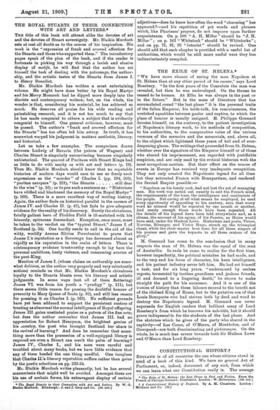THE EXILE OF ST. HELENA.*
"Ws have more chance of seeing the man Napoleon at St. Helena than at any other period of hie career," says 'Lord Rosebery. "In the first years of the Consulate the man was revealed, but then he was undeveloped. On the throne he
ceased to be human. At Elba he was always in the past or in the future." But in the mass of literature that has accumulated round "the last phase" it is the personal traits of the fallen Emperor, his table-talk, his reminiscences, the wretched squabbles between gaoler and captive, to which the place of honour is usually assigned. M. Philippe Gonnard devotes himself, on the contrary, to the patient investigation of Napoleon's literary work, to his methods of composition, to his authorities, to the comparative value of the various versions of the memoirs and the memorials, and, above all, to the object which lightened these years of toil and of ever- deepening gloom. The writings that proceeded from St. Helena, whether over the signature of the Emperor himself or of those who shared his imprisonment, are regarded with justifiable suspicion, and are only used by the critical historian with the most scrupulous caution. But their effect on the course of events in Europe has received very inadequate recognition. They not only created the Napoleonic legend for all time
but they saturated France with Bonapartism, and rendered the Second Empire possible:— " Napoleon on his lonely rock, had not lost the art of managing men. His work was meted out exactly to suit the French mind, the requirements of the time, the intelligence and sentiments of the people. Not caring at all what means he employed, he used every opportunity of appealing to his century, sure that every word lie uttered would be repeated by one mouth or another. And surely enough those words have been repeated. All the details of his legend have been told everywhere and, as a climax, the account of his agony, of his Passion, as Heine would have said, under Sir Hudson Lowe. Historians and poets, Thiers, Norvins, Wranger, and Victor Hugo, struck up the triumphal chant, while the choir master beat time for all these singers of his praises and gave the keynote to all these orators of his glory."
M. Gonnard has come to the conclusion, that in many respects the man of St. Helena was the equal of the, man of Austerlitz. In exile he came to realise for the first time, however imperfectly, the political mistakes he had made, and to the very end his force of character, his keen intelligence, and• his patient industry never left him. He had set himself a task, and for six long years, "undermined by useless regrets, tormented by tactless guardians and jealous friends, ill and doomed to a lingering death," he strove to make straight the path for his successor. And it is one of the ironies of history that these labours enured to the benefit not of the idolised King of Rome, but to the putative son of that Louis Bonaparte who had striven both by deed and word to destroy the Napoleonic legend. M. Gonnard can never supersede for English readers that brilliant essay of Lord Rosebery's from which he borrows his sub-title, but it should prove indispensable for the students of the last phase. And the sketches which he gives of the party who shared in the captivity—of Las Cases, of O'Meara, of Montholon, and of Gourgaud—are both discriminating and picturesque. On the whole, he is much less severe towards both Sir Hudson Lowe and O'Meara than Lord Rosebery.






































 Previous page
Previous page